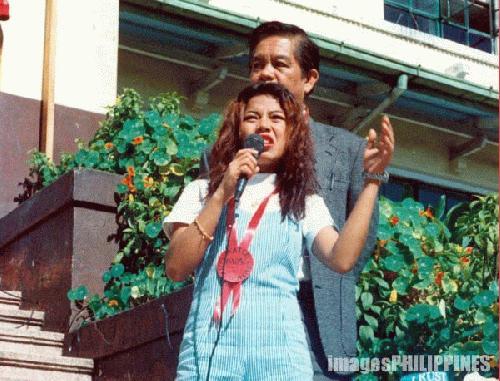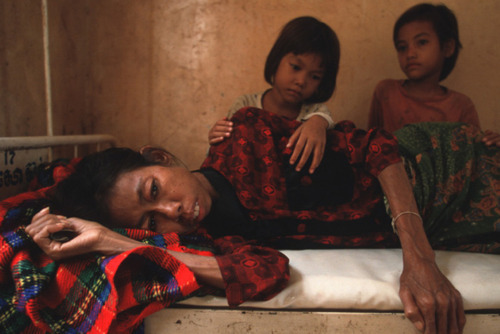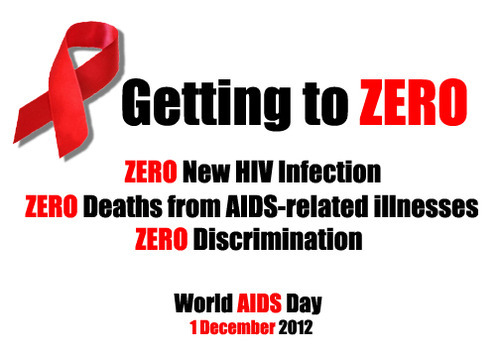When I was a little kid, there were two things that come to my mind whenever I hear the words AIDS and HIV. The first was Sarah Jane Salazar. Second, that it was a contagious, incurable, fatal disease, a death sentence of sort, and is something to be feared of.
Sarah Jane Salazar was a prominent figure during the late nineties. She was a Filipino AIDS activist and educator and the second Filipino with HIV to go public. She stirred controversy in 1997 when she was charged with child abuse for having sex with 16-year old Ritchie Atezado without protection. She later bore two children who were both tested negative for HIV. Her partner Rithchie, on the other hand, was later tested positive.

I was raised watching the evening news and current affairs programs (like Brigada Siyete and Magandang Gabi Bayan) and the story of Sarah Jane was like a serye that was being followed during those years. I can still recall the story of a young Arnold Clavio on Brigada Siete that documented Sarah Jane’s life, health, and advocacy. (Arnold Clavio would later become her kumpare when she asked the latter to be her child’s godfather.) In June 11, 2000, Sarah Jane died of AIDS complications.
Watching the stories of Sarah Jane and other victims, I saw AIDS then as something to be feared of. Seeing the images of victims from Africa and Cambodia, who have lost their appetite, thin, very sick, and abandoned by their loved ones added my fright to the disease.

Because of my fear of HIV/AIDS, I developed these beliefs. It has no cure. If you contacted it, then you must count your remaining days on this planet. You will be abandoned. You will be hated. You will be feared. It’s the modern-day leprosy wherein the victims must be isolated from the public.
But that was before I was educated on the disease. That was before I see things differently. That was before I expose myself to different stories of hope, survival, compassion, and love.
My first experience of awakening was when I watched one episode of Hirayamanawari (I’m not sure if it is that program or some other educational program during the last glorious days of quality local television programs). There was this boy (played by child actor Eman Abelada) who accidentally contacted HIV after undergoing a blood transfusion while undergoing an appendectomy. After being tested positive for HIV (and later, AIDS), his friends, due to their ignorance of the disease, started to isolate him for fear of contacting the same disease for they thought that mere physical contact can bring AIDS. The young boy died at the end of the story but thanks to the doctors and his parents’ help, his friends understand more what HIV and AIDS are.
With that simple presentation, the way I view the disease changed. It also thought me the importance of the support of the patient’s family and friends.
Fast forward to year 2000, I was in Grade 6 when we discussed HIV and AIDS in school. If my memory serves me right, it was included in our Science and Health subject. Our teacher, who happened to be one of my favorites, tackled the basics of the disease and on how it would be prevented. She even let us do a skit on how to avoid contacting the disease (infected needles, blood transfusion, etc.). Though included in our school textbook, for obvious reasons, we did not demonstrate how to practice safe sex then.
It has been more than a decade since I stopped fearing the disease. And in those years, I have encountered numerous movements, groups, and advocacy to raise the awareness to the disease.
In today’s world where sex can be as casual as a fist bump, various ways and movements to help stop the spread of HIV and AIDS have sprung up. Safe sex, condom, protection, you name it.
Safety. It’s as if it is stupid to go on a joust with another knight without your armor, it is also stupid to have sex without, er, protection.
Though some of the ways, beliefs and advocacy challenge my personal beliefs (and faith, if you may permit), I believe that we can all agree on a common ground wherein our similarities will help us fight together for a good cause:
Awareness. Education. Understanding. Empathy.
Awareness. In the course of history, battles are won primarily by acknowledging the peril, danger, and the possible aftermath of attacking the enemy. Before all the planning of military tactics and possibleattack, one must first acknowledge that there is an imminent threat or danger. The same thing goes with HIV and AIDS. they do exist. We may not have a cure yet for it but that doesn’t mean that we cannot do something about it.
Education. In my opinion, if there is one thing more fatal than the disease itself, it would be ignorance. HIV and AIDS have been here for quite sometime now and there are a lot of people who are willing to shed light on this feared disease. Know the disease. Know its symptoms. Know its cause. Know how to possibly avoid it. Your paranoia over the disease might be the cause of your early demise. Be educated. Call it a cliche but still, prevention is better than cure.
Understanding. Being aware and educated of the disease is not enough. There are HIV positive patients whose sufferings are doubled because of discrimination and the wrong and lack of understanding of the disease. I believe that there are bad things in this world which are brought primarily by misunderstanding. And we can be a part of changing these things.
Empathy. It is the capacity to recognize and share feelings that are being experienced by others. Unlike sympathy, empathy is like putting ourselves in the place of others. It is more personal. By putting ourselves into the mental shoes of another person, especially the victims of HIV and AIDS, we will know them better. It is only then that we can show wholeheartedly our love, support, and compassion.
I will not preach here about the different ways to prevent HIV and AIDS. I will just leave it to the experts. And I know that you are educated with the basic knowledge about the disease.
It doesn’t matter to me if you are a supporter or a critic of safe sex, condoms, and other protection. I believe that no matter how HIV and AIDS volunteers/counselors or your religious institutions teach you about how you use your personal and sexual freedom, the decision is still up to you.
An international group of scientists has traced the ancestry of the virus that caused AIDS back to strains found in African monkeys. If we will believe Charles Darwin’s theory, we humans are descendants of the earlier species of monkeys. But there are two things that differentiates us from this creatures aside from appendix - freedom and intellect.
We are creatures endowed with freedom and intellect. We are the ones who drive our own life. We have the control of our body. We are free to choose an option. We are intelligent creatures.

The theme for this year’s World AIDS Day is Getting to Zero: Zero new HIV infections, zero deaths from AIDS-related illnesses, zero discrimination. The Joint United Nations Programme on HIV/AIDS (UNAIDS) is praising the drop in new HIV cases throughout the world. Unfortunately, it is the opposite for the Philippines. You may have seen or read it on the news over the past weeks and months that the Philippines is one of the countries where the number of new HIV infections has increased by over 25%. While the threat of HIV and AIDS has been decreasing on the other parts of the globe, our country (together with 2 others in the SEA region) is now being categorized by UNAIDS and UNICEF as “having an expanding epidemic.” Isn’t it ironic?
Now what? Are we just letting the percentage of new infections increase? Of course not. We can all be a part of information dissemination and education about HIV and AIDS. What’s the use of our country being a social media capital of the world if we don’t use our power for a good cause? And with a beacon of hope manifested by the decrease of new infections in other parts of the globe, I think it’s a huge step to finally reverse the rate of new infections if not totally wipe out HIV and AIDS on the face of this planet. Just like small pox. eh?
As we commemorate today’s World AIDS Day, let us be aware of the disease, be educated on how to prevent it, understand the victims, and empathize to help them fight the disease. Together, we can defeat this. I hope this year’s celebration is one of the last ones.
Spread the love. Spread the word. Spread the knowledge. Not the virus.
Elsewhere:
- Getting to Zero- Philippine STAR’s editorial about the World AIDS Day 2012.
- I am no expert when it comes to AIDS and HIV but you can talk to my good old Tumblr buddy Gelo (@pananaghoy), an HIV counselor from the AIDS Society of the Philippines. You can also visit his blog and see the other important links on his page.
- The AIDS Society of the Philippines - The AIDS Society of the Philippines (ASP) is a leading association of individuals from the government, non-government agencies, and the private sector, with a common unifying interest in preventing the spread of HIV and AIDS.
- Take the Test Project - they provide adequate information about HIV and AIDS and make HIV test more accessible to everyone.